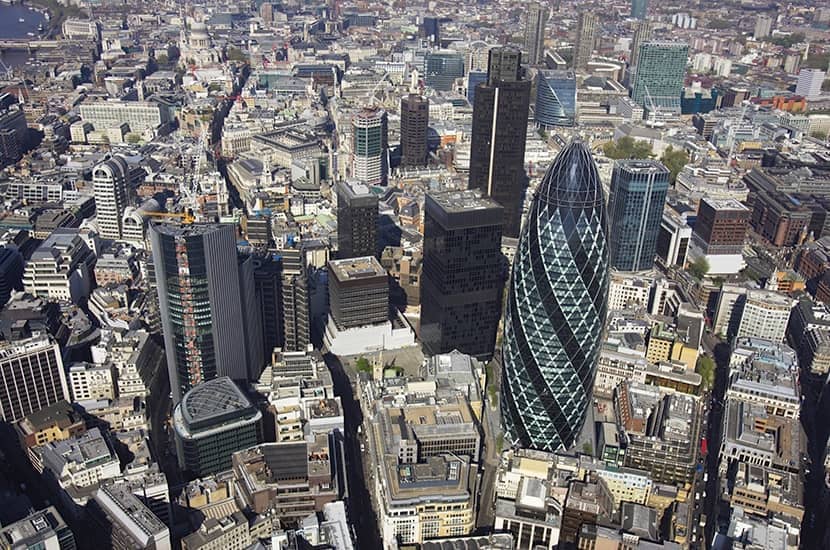For all its faults and foibles, its busts and bailouts, modern market capitalism demonstrates a remarkably bullish resilience. We don’t always love it. We might not even trust it. But, like a cranky old spouse, we doggedly stick with it.
It’s not hard to guess why. Look around, and people today in the main are better off. More importantly, the alternatives seem doubtful. As Bill Gates once put it: ‘Anyone who wants to move to North Korea is welcome.’ Even so, there’s a nervousness afoot in the epicentres of free enterprise. Inequality is growing, executive pay is spiralling, high street favourites are disappearing, employment terms are worsening. Forget levelling up; just staying afloat feels like achievement enough.
What’s gone wrong? Has Schumpeter’s destructive capitalism gone rogue and started cannibalising itself? Or are these just hiccups in a dynamic, ever-evolving system? There is little question which side Martin Vander Weyer comes down on. A former investment banker and longtime business editor of this magazine, he views capitalism as the ‘greatest engine of human progress ever invented’. Defending it against attack feels almost personal. In energetic, sometimes pugnacious prose, The Good, the Bad and the Greedy swats away leftist critiques quicker than Lord Sugar can say ‘You’re fired’.
Much of the moaning from ‘bien pensant circles’ derives, says Vander Weyer, from woolly idealism or straightforward wealth envy. Despite Britain’s long history of mercantilism, money-making still carries a certain cultural grubbiness, he notes: ‘That makes us very different from the Americans — and indeed from the Chinese… for whom business success has generally been seen as an unmixed good.’ Not that all alternatives are bad. Co-operatives, building societies and employee-owned businesses all get favourable treatment. But as ‘viable large-scale substitutes for shareholder capitalism’? Not a chance. All lack that magic quality: scalability.
No, what this urgent defence of capitalism argues for is not reform of the most powerful economic force in human history but restoration to its better self: repair, not redesign, in other words.
For all his pro-market zeal, Vander Weyer doesn’t underestimate the task at hand. Like incompetent housebuilders, global business leaders have left a snag list as long as a Google search page. Much of the rot stems from financial institutions, he contends, which — as a biographer of Barclays and the son of a former senior executive at the bank — he has observed closely for four decades or more.
At heart, the problems of Wall Street and the City fall into one of two buckets: weak governance (think bundling subprime mortgages into opaque financial instruments) and lax morals (Barings Bank’s Nick Leeson, the Ponzi scheme supremo Bernie Madoff etc). Both problems are exacerbated by modern capitalism’s obsession with size. Growth, conventional wisdom goes, is good. The bigger a company’s reach, the larger its slice of the pie. But size also introduces greater business instability and larger management blind spots.
Take HSBC. Held up as a paragon of prudence, the UK bank survived the 2008 financial crisis relatively unscathed. Even so, its famed checks and balances did nothing to prevent its Mexican operations channelling cash for drug cartels and dodgy Russians. ‘What company needs to be so big that its senior executives cannot know what all its middle managers round the world are up to?’ Vander Weyer asks. Answer: none.
For a healthier model, look to Timpson, the shoe-repair people. Bumping into the chief executive at a City dinner, the author noted the good service he had recently received at one of the firm’s London branches. Quick as a flash, James Timpson replied with the relevant employee’s name — ‘Jimmy, quite a character’ — impressing on Vander Weyer the role that kindness and personal relationships play in putting the ‘good’ into capitalism. If only the Zuckerbergs and Bransons of this world could retrieve their individual moral compasses, all would be well, he concludes: ‘The sort of capitalism that is more admired than mistrusted happens when its leaders behave in business life exactly as they would in private life.’
The value of that conclusion rests on two key assumptions: that today’s titans of industry are good little Boy Scouts when at home; and that, should the dark green glaze of greed ever descend, then capitalism’s regulators are on hand to rein it in. So, in sum, a slightly more benign, better governed version of the system already in place. Is that really the best we can hope for? And, with corporate giantism now baked in, hasn’t that horse already bolted? As lively and persuasively made as Vander Weyer’s arguments for repair certainly are, The Good, the Bad and the Greedy is essentially a backward-looking book. Sure, North Korea still sucks, but the rest of the world is changing fast.
Having shaped our past, capitalism desperately needs a compelling vision for how it will shape our futures — for all our good, critics and defenders alike.






Comments